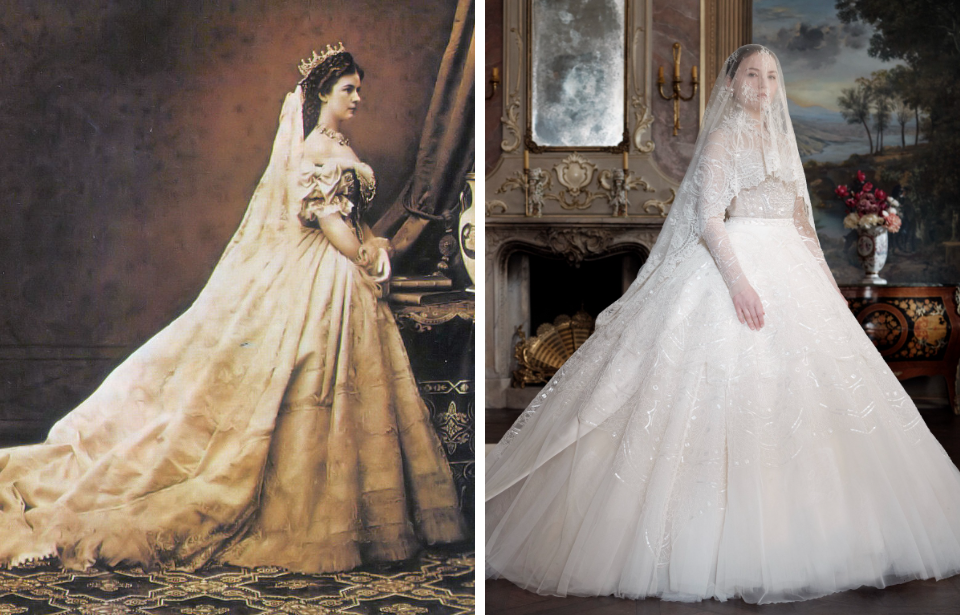Period dramas are all the rage on TV, prompting lots of production companies to come up with their own. Online streaming platform Netflix has certainly hit the mark. Their series, The Empress, follows the tragic life of the Bavarian Duchess Elisabeth, who married the Austrian Emperor Franz Joseph to become Empress of Austria at only 16 years old.
Produced in Germany, the series introduced not only the romantic plot line between Elisabeth and Franz, but many different members of the Austrian court. Viewers also meet the family members of both main characters, all constantly scheming to earn themselves better positions at court. Although these characters are certainly dramatized, they are all based on real people. Here is what the actors look like compared to their real-life counterparts.
Elisabeth von Wittelsbach
The show centers around Elisabeth von Wittelsback, who was born into a Bavarian royal family. Devrim Lingnau took on this role in The Empress, portraying Elisabeth’s life – which cannot be described in any way other than tragic. After marrying Emperor Franz Joseph I, she became Empress of Austria and eventually Queen of Hungary. From the time that she first entered court she was at odds with her mother-in-law, who constantly looked down on her.
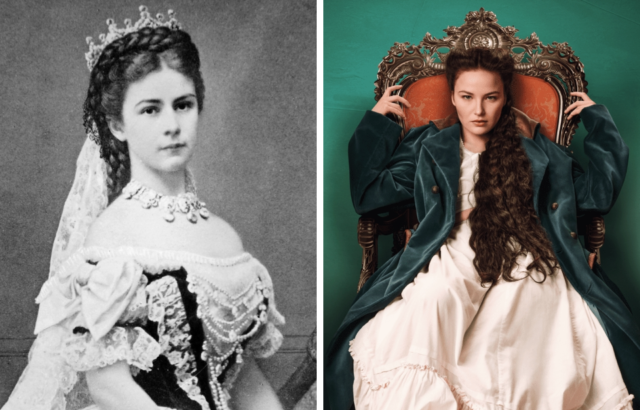
She did give birth to a single son, however, he died in a murder-suicide with his mistress in 1889. In 1897, her sister died in a fire. Elisabeth’s life came to an end after she was stabbed by an Italian anarchist while in Geneva, Switzerland, where she sustained injuries she simply couldn’t recover from. Elisabeth is well known for her obsession with maintaining a youthful appearance, as well as her aggressive exercise routine and spending hours tending to her long hair.
Franz Joseph I of Austria
The role of Elisabeth’s husband, Franz Joseph I, was taken on by Philip Froissant in The Empress. Franz acceded the throne in 1848, marrying Elisabeth just a few years later in 1854. By many accounts he held a deep affection for her up until her death, despite the many trials that they faced throughout their marriage. Initially, he ruled the Austrian Empire but eventually divided it into a dual monarchy, the Austro-Hungarian Empire, in 1867.
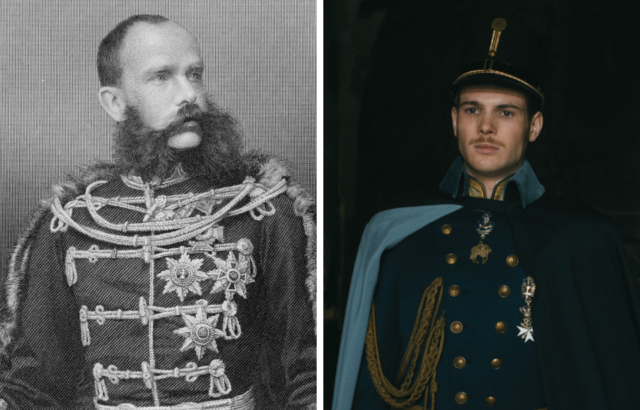
Franz is arguably best known for his role in the start of the First World War. His nephew was Archduke Franz Ferdinand whose death is considered one of the many factors that started the war. The Archduke was supposed to take the throne after Franz, so his death was a serious affair. Following the assassination in 1914, Franz Joseph issued the infamous ultimatum to Serbia which led Austria, and his German allies, into the war.
Princess Sophie of Bavaria
Melika Foroutan plays the role of Princess Sophie, the Tigress of Bavaria. She was the mother of Franz Joseph I and became the Archduchess of Austria after marrying Archduke Franz Karl of Austria. Although she was considered by many to be authoritarian and strong-willed, she was also extremely devoted to her family and the empire that she became a part of.

As a mother, she was extremely invested in her sons, arguably to a fault. She is one of the main reasons Franz Joseph was put on the throne, rather than his father. Sophie realized that if her husband took the throne she would have little say in his actions. Her son Franz Joseph, on the other hand, would be more likely to listen to her. She succeeded in convincing her husband not to take the throne, instead standing by her son’s side while he ruled.
Archduke Maximilian
Played by Johannes Nussbaum in The Empress, Archduke Maximilian, brother to Franz Joseph, was initially his mother’s favorite. That of course changed when his brother was put on the throne. Maximilian did manage to make a name for himself independently of his mother and brother, however, serving as a rear admiral in the Austrian Navy.
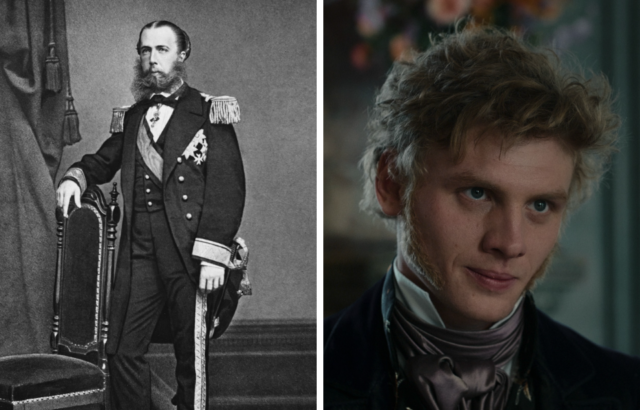
Following the French invasion of Mexico, Maximilian was asked by Emperor Napoleon III to set up a monarchy in the country that would act in favor of the French. He agreed, briefly ruling as the Emperor of the Second Mexican Empire from 1864 to 1867, when he was executed.
Duchess Helene in Bavaria
Elisa Schlott plays the role of Duchess Helene, the woman who almost became the Austrian Empress instead of her sister Elisabeth. In 1953 she went to meet her cousin, Franz Joseph, along with her mother and sister, with the hopes that the two would marry. Unfortunately, however, Franz Joseph preferred her sister and married her instead.
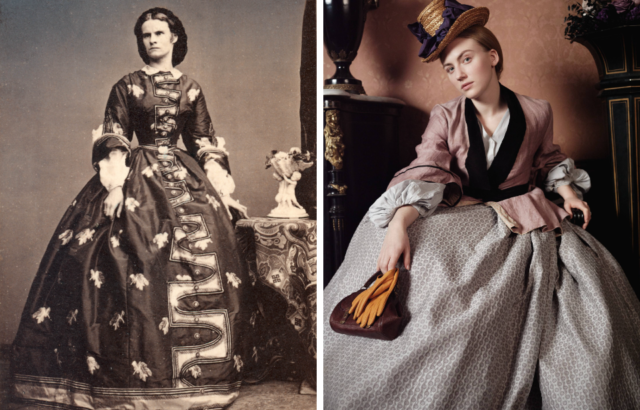
Sources say that this failed chance at marriage sent Helene into a depression, to the point that her mother was worried that she would simply join a convent and swear off men and marriage. She tried romance again at the age of 22, which during the period was considered to be a very old age to marry. This setup was more successful. She married and started a family with Maximilian Anton Lamoral, Hereditary Prince of Thurn and Taxis.
Princess Ludovika of Bavaria
Elisabeth’s mother, Princess Ludovika of Bavaria, is played by Jördis Triebel in The Empress. Ludovika married Maximilian Joseph, Duke of Bavaria, although it was known she was disappointed not to marry someone of higher standing. It didn’t help that her husband had a great fondness for circuses, a pastime that she saw as peculiar and childish.
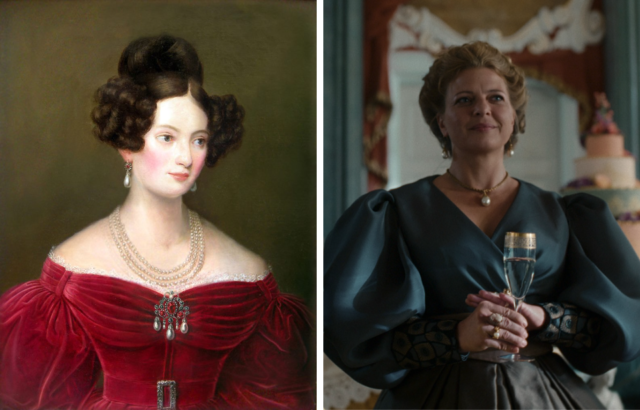
Throughout their marriage, she had 10 children with her husband. Other than Elisabeth, the child that earned the highest standing was Queen Maria Sofia of the Two Sicilies. Princess Ludovika lived to the impressive age of 83, and was married to her husband for over 50 years.
Countess Sophie Esterházy
Wiebke Puls plays Princess Sophie Marie Josepha von und zu Liechtenstein, more commonly known as Countess Sophie Esterházy. She married Count Vincenz Esterházy von Galántha in Austria and worked in the Austrian royal court, serving as the Mistress of the Robes to the Empress.
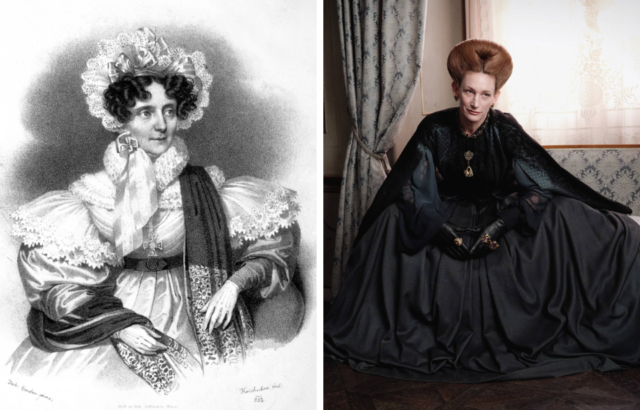
More from us: The Crown: How Netflix Casts the Controversial Royal Drama
Despite her position, she was greatly disliked by Elisabeth. This is perhaps because she was a close friend of Princess Sophie of Bavaria, who hated her daughter-in-law. Although Countess Sophie technically served the Empress, it was reported that she acted more like a governess, bossing her around constantly.
